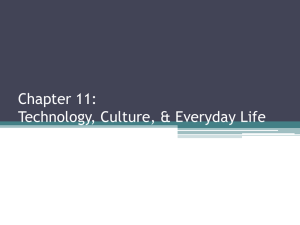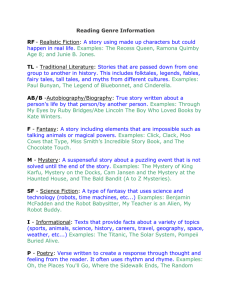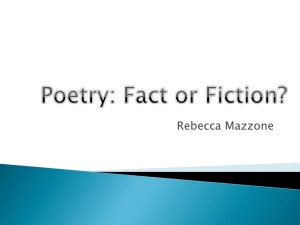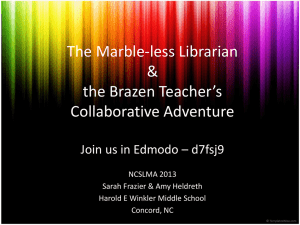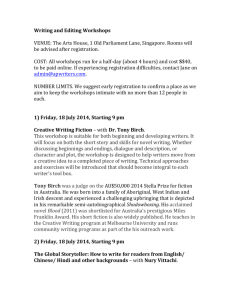Creative-Acts-Fall2013
advertisement
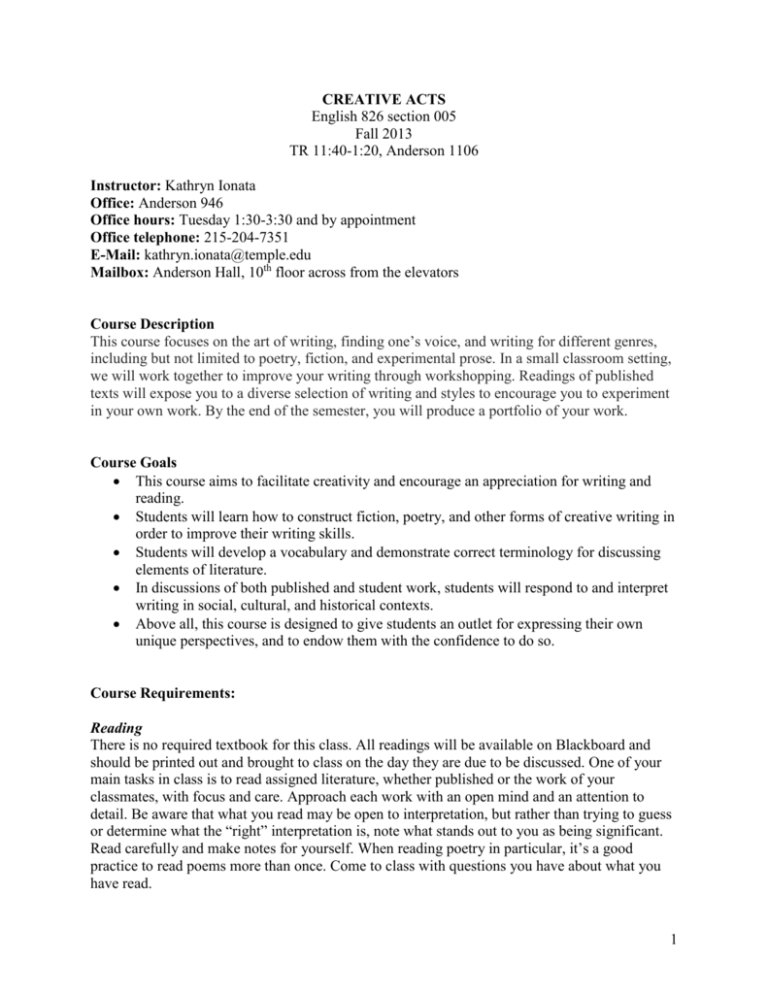
CREATIVE ACTS English 826 section 005 Fall 2013 TR 11:40-1:20, Anderson 1106 Instructor: Kathryn Ionata Office: Anderson 946 Office hours: Tuesday 1:30-3:30 and by appointment Office telephone: 215-204-7351 E-Mail: kathryn.ionata@temple.edu Mailbox: Anderson Hall, 10th floor across from the elevators Course Description This course focuses on the art of writing, finding one’s voice, and writing for different genres, including but not limited to poetry, fiction, and experimental prose. In a small classroom setting, we will work together to improve your writing through workshopping. Readings of published texts will expose you to a diverse selection of writing and styles to encourage you to experiment in your own work. By the end of the semester, you will produce a portfolio of your work. Course Goals This course aims to facilitate creativity and encourage an appreciation for writing and reading. Students will learn how to construct fiction, poetry, and other forms of creative writing in order to improve their writing skills. Students will develop a vocabulary and demonstrate correct terminology for discussing elements of literature. In discussions of both published and student work, students will respond to and interpret writing in social, cultural, and historical contexts. Above all, this course is designed to give students an outlet for expressing their own unique perspectives, and to endow them with the confidence to do so. Course Requirements: Reading There is no required textbook for this class. All readings will be available on Blackboard and should be printed out and brought to class on the day they are due to be discussed. One of your main tasks in class is to read assigned literature, whether published or the work of your classmates, with focus and care. Approach each work with an open mind and an attention to detail. Be aware that what you read may be open to interpretation, but rather than trying to guess or determine what the “right” interpretation is, note what stands out to you as being significant. Read carefully and make notes for yourself. When reading poetry in particular, it’s a good practice to read poems more than once. Come to class with questions you have about what you have read. 1 Attendance Because this is a small and interactive class, your attendance and participation are essential to your success. As such, they are reflected in your final grade. Attendance counts for 10% of your grade. If you miss no more than 2 classes, you will receive the full 10%. With more absences, your grade will diminish accordingly. If you are absent 5 or more times, it will not be possible to pass the class. Keep in mind that two late arrivals or early departures will count as one absence. Excluding extreme and documented emergencies, you must be in class on the day your writing is due to be distributed or workshopped, or you will lose the opportunity to participate in the workshop and take a zero for the assignment. Participation Good participation in this course means coming to class with any readings and written assignments completed, and being prepared to actively contribute to discussions and activities in a thoughtful manner. Share observations and opinions, and treat your classmates with respect. No cell phones or electronic devices. You must get my permission to use a laptop or reader. Participation is worth 15% of your grade. If you contribute to discussions every class, you will receive the full 15%. If you rarely or never participate, your grade will diminish accordingly. Writing exercises Several times over the course of the semester, you will be required to complete writing exercises for homework. Usually these writing assignments will be written in response to or inspired by a published text we read for class. These exercises are designed to give you the opportunity to experiment with different kinds of writing. Workshops We will devote several weeks of the semester to workshop, meaning that everyone receives a copy of the writer’s work prior to class, reads and writes comments, and discusses it as a class. Typically, we will workshop 4 students per class meeting. Everyone will sign up for a spot in the rotation. If your work is due to be workshopped on a Thursday, you should be prepared to distribute (25) copies of your writing on Tuesday. You can get copies made for free by filling out a form in the Undergraduate English office on the 10th floor of Anderson Hall, but you must allow 24 hours for copying. Our first round of workshop will be devoted to poetry, and each student should submit 2-3 pages of work. Our second round of workshop will be devoted to fiction, and each student should submit 4-7 pages of work. Our third round of workshop is a little different: rather than being a full class workshop, instead you will break into small groups of 4 or 5 and workshop within your group only. We will discuss workshopping further before our first round begins. Please note that what you submit to workshop must be different than the work you submit for the homework writing exercises. Submitting the same work for both a writing exercise and a workshop will result in a failing grade for the latter assignment. However, you are welcome to develop any in-class writing we do and use it for either a future workshop. 2 A note on late work: I expect you to turn in your work on time. If you are absent on the day an assignment is due, email me the assignment by class time and bring a hard copy to the next class meeting. Otherwise, late assignments (such as writing exercises or commentaries) will lose points for each day of lateness. If you anticipate needing more time on an assignment, tell me well before the assignment is due and I will consider granting you an extension, although this is by no means guaranteed. Due to scheduling constraints, it is not possible to turn in workshop stories late. Commentaries For each workshop, write a letter to the author telling him or her what works in the writing and what could be improved, and how. This should be typed and ready to give to the author on the day of the workshop. Please print out an extra copy of the letter for me. This letter should be approximately 2 paragraphs or 1 page long. If you make notes on the author’s poem or story, give that to him or her as well. Sign your name to everything—no anonymous commentaries. I will give out more instructions about this before our first workshop. Final portfolio Due on the last day of class, your portfolio should consist of the following: Revisions of the work you distributed for any two of the three workshops, along with the original copies (the ones with my comments) Revisions of two of the writing exercises you completed for homework, along with the original copies (the ones with my comments) A 1-2 page letter of reflection A final writing project of 4-6 pages, the genre and style of which is your choice. You may write fiction or poetry, a combination thereof, an experimental piece, something that incorporates images or music, etc. I will give you more details as the due date approaches. Formatting tips Unless specifically instructed otherwise, please type all your work. Poetry is generally single-spaced (although this very much depends on the writer and poem), whereas fiction and other prose, such as commentaries, should be double spaced for easier readability and commenting. Staple any document with multiple pages. By all means, feel free to print double-sided to save paper and money. Grade breakdown Workshops: 10% Writing assignments: 10% Attendance: 10% Participation: 15% Commentaries: 15% Final portfolio: 40% 3 Please note that in a workshop it is more difficult to track your grade than in other courses. If you have questions about your grade at any point during the semester, come see me and we can discuss your standing in class. Plagiarism Plagiarism is a crime that will result in your failing the course and possibly being suspended or expelled from the university. Plagiarism includes submitting the work of someone else; helping others to plagiarize; doing the work of another person; or submitting work in one course that was done for another. If you have any questions about what constitutes plagiarism, make sure to consult with me before you turn in the work; it will be too late afterwards. Disability Policy Any student who has a need for accommodation based on the impact of a disability should contact me privately to discuss the specific situation as soon as possible. Contact Disability Resources and Services at 215-204-1280 in 100 Ritter Annex to coordinate reasonable accommodations for students with documented disabilities. Student and Faculty Academic Rights and Responsibilities Policy: Freedom to teach and freedom to learn are inseparable facets of academic freedom. The University has a policy on Student and Faculty and Academic Rights and Responsibilities (Policy #03.70.02), which can be accessed through the following link: http://policies.temple.edu/getdoc.asp?policy_no=03.70.02. Course schedule Week 1: Introductions and poetry T August 27: Review syllabus Introductions R August 29: Week 2: Poetry T September 3: R September 5: Jeffrey McDaniel selection Excerpt from The Practice of Creative Writing, “A Word on Words” Kim Addonizio selection Writing exercise #1 due Guest poet: Warren C. Longmire Slam poetry selection Writing exercise #2 due Week 3: Poetry & workshop T September 10: Frank O’Hara selection 4 R September 12: Workshop students 1, 2, 3, 4 Week 4: Poetry workshop T September 17: Workshop students 5, 6, 7, 8 R September 19: Workshop students 9, 10, 11, 12 Week 5: Poetry workshop T September 24: Workshop students 13, 14, 15, 16 R September 26: Workshop students 17, 18, 19, 20 Week 6: Poetry workshop & fiction T October 1: Workshop students 21, 22, 23, 24, 25 R October 3: Week 7: Fiction T October 8: R October 10: Week 8: Fiction T October 15: R October 17: Junot Díaz, “How to Date a Browngirl, Blackgirl, Whitegirl or Halfie” Aryn Kyle, “Brides” Writing exercise #3 due Excerpt from The Practice of Creative Writing, “Focus on What’s Fascinating” Writing in the city (meet at Broad St. and Cecil B. Moore Ave., in front of southbound subway, at 11:40) Alice Walker, “Flowers” Julia Alvarez, “Snow” Writing exercise #4 due J.D. Salinger, “A Perfect Day for Bananafish” Excerpt from The Practice of Creative Writing, “Ways to Be Unwise” Gish Jen, “Who’s Irish?” Dan Chaon, “The Bees” Week 9: Fiction workshop T October 22: Workshop students 1, 2, 3, 4 R October 24: Workshop students 5, 6, 7, 8 Week 10: Fiction workshop T October 29: Workshop students 9, 10, 11, 12 R October 31: Workshop students 13, 14, 15, 16 5 Week 11: Fiction workshop T November 5: Workshop students 17, 18, 19, 20, 21 R November 7: Workshop students 22, 23, 24, 25 Week 12: Experimental writing T November 12: Sandra Cisneros, “Barbie-Q” Sandra Cisneros, “Anguiano religious articles rosaries statues” Writing exercise #5 due R November 14: Margaret Atwood, “Happy Endings” Excerpt from The Practice of Creative Writing, “Revision is Seeing Again” Week 13: Experimental writing T November 19: Rick Moody, “Boys” Mike Lacher, “I’m Comic Sans, Asshole” R November 21: Jesse Porter, “Trader Joe’s, Circa 1877” Bring in example of experimental writing Writing exercise # 6 due Week 14: Experimental writing workshop T November 26: Group workshop R November 28: No class. Happy Thanksgiving! Week 15 T December 3: Final portfolios due 6

